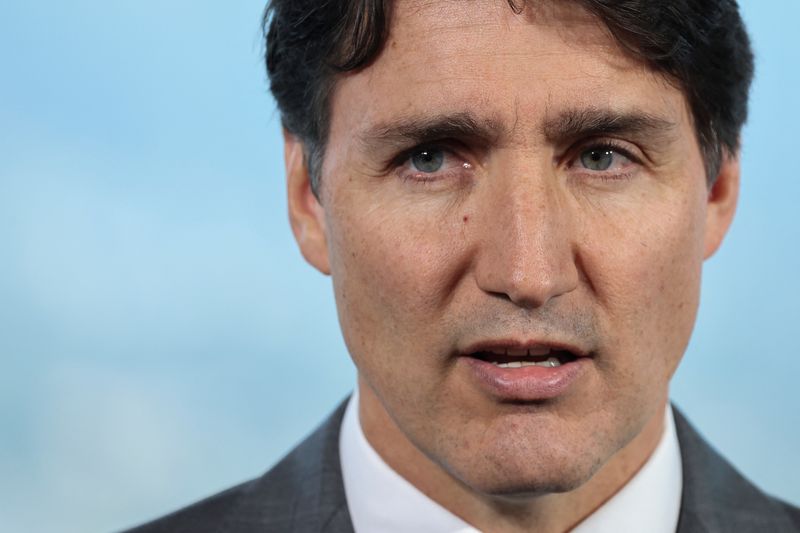By Promit Mukherjee
OTTAWA (Reuters) - Canada's promise this week to increase defense spending to 2% of GDP by 2032 was welcome news to the country's NATO allies, but meeting that commitment could push Canada deeper into deficit or force major cuts in spending, economists said.
Prime Minister Justin Trudeau committed Canada to the timeline to meet the 2% target after coming under mounting pressure from the United States and other NATO powers, including sharp criticism from some prominent U.S. lawmakers, to spell out its intentions.
But economists say Canada will have to make some uncomfortable choices if it is to keep its promise, even as the commitment boosts the country's standing among its allies at a time when Russia's invasion of Ukraine has put the alliance on high alert.
Canada currently spends around 1.4% of its GDP on defense.
In the nine years that Trudeau has served as prime minister, total government spending has increased by 75%, with the additional funds going primarily toward public health programs, social services and salaries of government employees.
A multibillion-dollar home-building scheme and a pharmacy care plan are expected to add pressure over the coming years.
The increase has swelled the country's deficit from C$550 million ($403.43 million) to almost C$40 billion and inflated its debt to 42% of GDP last year from 31.5% in 2014-15.
The rising debt could bring Canada close to breaching its own fiscal anchors, recently adopted to stop government debt from ballooning further.
"If it had to do it today, it is quite difficult in terms of how the government can actually manage the funding," said David Perry, a defense expert who serves as president and CEO of the Canadian Global Affairs Institute.
To be sure, the goal of achieving the 2% target by 2032 is too far into the future to accurately forecast the state of the government's finances, but from the perspective of 2024, there is no smooth path to follow.
Economists have said that taking on more debt or bad deficit management could hurt Canada's stellar credit ratings.
A 2% defense spending goal by 2032 would require an additional allocation of C$15 billion to C$20 billion over the next eight years, and that cannot be met by increasing taxes alone, economists said.
Canada plans to increase its spending on defense to 1.76% of GDP by 2030. Of the 32 NATO member countries, 23 are on track to meet or exceed the 2% goal this year, according to NATO's latest estimates.
"Unless you do it all in one year, you have to slowly crank up your spending," said Pedro Antunes, chief economist of the Conference Board of Canada, an independent think tank.
A gradual approach would mean taking on more debt and higher interest payments every year, which could bump Canada over its fiscal guard rails, he said, adding it could make the fiscal situation precarious from the next budget.
Increasing taxes to bump up revenues will not go down well with the electorate at a time when Trudeau's Liberal government is already showing weakness in public opinion polls, Atunes said.
Last year Finance Minister Chrystia Freeland adopted new fiscal anchors, capping the fiscal deficit at C$40.1 billion, lowering debt as a share of GDP this year and keeping the ratio declining thereafter. The aim is to keep the deficit from exceeding 1% of GDP from 2026-27.
"The federal government risks violating at least one of its fiscal anchors by increasing defense spending to 2% of GDP by 2032," said Randall Bartlett, senior director of Canadian economics with Desjardins Group.
To stay within the fiscal anchors as spending rises, Freeland earlier this year raised the amount of capital gains subject to tax for wealthy individuals and made all capital gains realized by companies subject to tax, which was criticized by investors, economists and business owners.
Craig Alexander, president of Alexander Economic Views, an independent economic research organization, said Ottawa would have to eliminate or slash spending on some programs, such as business subsidies or the size of its federal service if it wanted to meet the 2% target
Business subsidies under Trudeau increased by 140% over the last nine years as compared with 17% over the previous nine years, John Lester, an economist with the C.D. Howe Institute, wrote in April.

Similarly, the Public Service Commission of Canada said in a report that the size of the federal work force, which gobbles up a big portion of government spending, swelled by 40% in the same period. Canada now employs more federal workers than ever before.
($1 = 1.3633 Canadian dollars)
